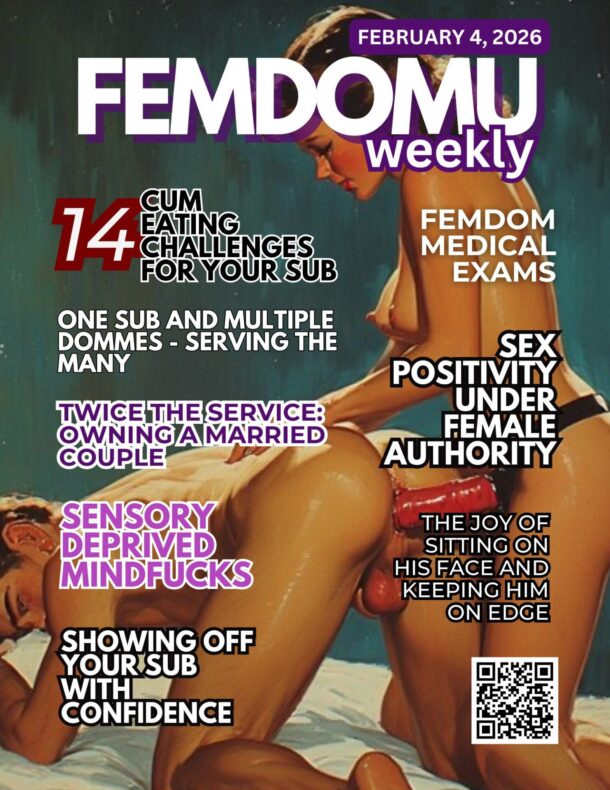
The Ethics Behind Cuckolding as Discipline
Cuckolding as Punishment: Navigating the Ethical Complexities
Cuckolding, traditionally understood within the BDSM community as a consensual and mutually gratifying experience centered around elements of voyeurism, humiliation, and the eroticization of jealousy, has seen varied applications. Some practitioners of female-led relationships have explored using cuckolding specifically as a form of punishment. This practice, however, raises significant ethical questions, particularly when the submissive partner may not be wholly enthusiastic about participating. This article delves into the nuances of using cuckolding as a disciplinary measure, examining the ethical considerations that must be addressed to maintain the integrity and consensual nature of the BDSM dynamic.

The Dynamics of Cuckolding as Punishment
In certain BDSM relationships, particularly those involving a dominant female and a submissive male, cuckolding has been used not just for mutual sexual excitement but also as a form of punishment. This might occur for various reasons:
- To penalize for mistakes or misbehavior.
- As part of a broader dynamic of humiliation and control.
- Because it provides sexual gratification for one or both partners within the established rules of their relationship.
However, cuckolding used as punishment introduces a complex layer of dynamics because it involves not just the dominant and submissive but a third party as well. This triangle complicates consent, a foundational pillar of ethical BDSM practices.
Ethical Considerations in Punitive Cuckolding
Cuckolding as Punishment – Ethical or Not?
Cuckolding, a complex and often controversial practice, finds its way into many dynamics within the world of female dominance. At its core, cuckolding involves a submissive partner, typically a male, deriving satisfaction or experiencing humiliation from his partner’s sexual interactions with another person, often referred to as the “bull.” While many view cuckolding as a consensual and exhilarating part of their relationship, using it as a form of punishment raises significant ethical questions. This article delves into the intricacies of using cuckolding as a punitive measure, exploring the balance between consent, power, and ethics.
Understanding Cuckolding as Punishment
In the realm of Femdom, punishment serves multiple purposes: correcting behavior, reinforcing power dynamics, or providing a sadistic pleasure for the dominant. Cuckolding, when used as a punishment, takes these purposes to an intense level by introducing another party into the dynamic and leveraging feelings of jealousy, humiliation, and loss of control.
Ethical Considerations
1. Consent and Mutual Interest
The cornerstone of any BDSM practice, including cuckolding, is consent. Both partners must fully understand and agree to the activities they engage in. Using cuckolding as a punishment against a partner’s will, even within an established power exchange, risks violating this fundamental principle. If a submissive is not genuinely interested in cuckolding, forcing them into such a scenario can lead to emotional harm and a breach of trust.
2. Power Dynamics
The power dynamics in a Femdom relationship are complex and require careful management. While the dominant partner holds the reins, the submissive’s well-being and boundaries must always be respected. Punishing a submissive with cuckolding without their enthusiastic consent can destabilize these dynamics, leading to resentment and a breakdown of the relationship’s trust and communication.
3. Psychological Impact
Cuckolding can trigger intense emotions, including jealousy, inadequacy, and humiliation. For some, these feelings are an exciting part of the experience, but for others, they can be profoundly damaging. Using cuckolding as a punishment needs to be approached with an acute awareness of the potential psychological impact on the submissive partner.
Scenarios and Ethical Variables
Punishing as Part of the Dynamic
For some couples, punishment is an integral part of their dynamic, agreed upon and enjoyed by both parties. In such cases, cuckolding as punishment can be ethically permissible if it aligns with previously established boundaries and consent. It becomes a tool to deepen the power exchange, reinforcing roles and adding a layer of excitement.
Making Him Pay for a Mistake
Using cuckolding to punish a submissive for a mistake introduces a layer of ethical complexity. The punishment must be proportionate to the transgression and within the submissive’s limits. Discussing and negotiating these limits beforehand is crucial to ensure that the punishment remains a consensual and constructive part of the relationship.
Unilateral Enjoyment
If cuckolding is something only the dominant partner enjoys, its use as a punishment can become ethically problematic. The dominant partner must carefully consider whether their enjoyment justifies the potential emotional distress inflicted on the submissive. Ethical dominance prioritizes the submissive’s mental and emotional health, ensuring that any activity, including punishment, is ultimately for their benefit as well.
Navigating the Ethical Landscape
Open Communication
Regular, honest communication is vital in navigating the ethical landscape of using cuckolding as punishment. Both partners should openly discuss their feelings, fears, and boundaries. This dialogue helps ensure that both parties are comfortable and that the power exchange remains consensual and fulfilling.
Revisiting Consent
Consent is not a one-time agreement but an ongoing process. Revisit consent regularly, especially after intense sessions involving cuckolding. Checking in on the submissive’s emotional state and reaffirming their willingness to continue is essential.
Safe Words and Signals
Implementing safe words and signals allows the submissive to halt or slow down the activity if it becomes too overwhelming. This safety mechanism ensures that the power dynamic is exercised responsibly and ethically.
Conclusion
Cuckolding as a punishment occupies a delicate space within the spectrum of BDSM practices. While it can be a potent tool for reinforcing power dynamics and exploring deeper aspects of a relationship, its ethical implications must be carefully considered. Consent, communication, and respect for boundaries are paramount. By navigating these complexities with care and empathy, couples can ensure that their exploration of cuckolding remains a consensual and enriching part of their dynamic, rather than a source of harm and resentment.
Communication and Safeguards
Ethical cuckolding as punishment requires meticulous communication before its enactment. All parties must fully understand and agree to the specific terms of the encounter. It’s crucial to establish safe words or signals, particularly because cuckolding can evoke unexpectedly intense emotions. Both partners should have the power to stop the activity if it becomes psychologically overwhelming.
Emotional Impact and Aftercare
The psychological impact of cuckolding, particularly when used as a form of punishment, can be profound. The potential for lasting negative effects, such as issues with trust, self-esteem, and emotional security, necessitates a strong aftercare plan. Aftercare should address both physical and emotional well-being, helping to reestablish trust and affection between the dominant and the submissive.
Evaluating Motives and Outcomes
It is essential to critically evaluate the motives behind using cuckolding as punishment. If the primary intent is to cause pain or degradation without a constructive component to the relationship, it may veer into unethical territory. The outcomes of such scenes should be carefully considered—are they fostering growth and understanding in the relationship, or are they causing harm?
Conclusion
Using cuckolding as a form of punishment in a BDSM context is fraught with ethical challenges that require careful navigation. It is imperative to ensure that such practices are based on a foundation of informed, enthusiastic consent and that they contribute positively to the relational dynamic. Ethical BDSM practice is not about exerting control without accountability but about exploring power dynamics in a manner that respects the dignity and autonomy of all involved. As such, cuckolding, when used as punishment, must be approached with sensitivity, clear communication, and a strong commitment to the principles of safety, sanity, and consensuality.

















































Latest Comments